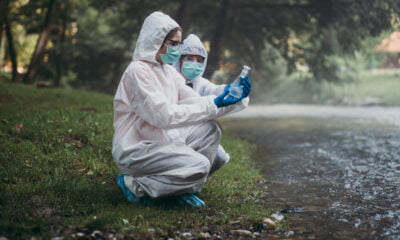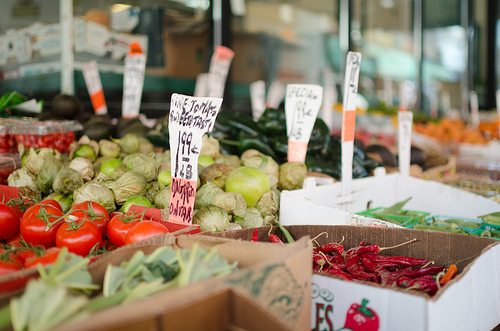

Economy
The ‘nude food’ revolution: an investment for our future
Down in a quirky bar in the hippy, trippy surf town of Byron Bay on Australia’s east coast, another artist got to the stage. I am pretty arty and open-minded, but this night had been more hippy and trippy than most, so when a man climbed up carrying a small bin, and we were told that before his performance he would tell us about his project, my heart did sink a little.
But that bin and its story captivated me so much that I actually tracked down the owner in the people’s supermarket in which he works, to find out more. Concerned by our rising oceans, damaged environment and human health, and aware of how not only what we eat but how that food is eaten, produced and packaged affects the ecosystem, Paul Creber has set up Byron Bay’s Nude Your Food collective, now in its second year and making strong traction.
Creber is founder and director of the collective set up to encourage individuals to each take responsibility for being part of a movement that will shape our future food system. He aims to cease any further environmental degradation caused by what he sees as the current broken food system; especially in regards to plastic pollution and the health risks associated with the leaching of chemicals in food.
I had a chat with him about the project; the excessive use of packaging in our food production and what this says about the companies who run it; the idea of reusing and the concept of waste; and whether change is possible.
How much rubbish did you collect in one year again?
In one year I collected 40 litres of uncompressed plastic waste – so 20 two-litre milk bottles to give a good visual, or two small waste paper bins. [According to the Waste Management Institute, the average person in a high income society generates 550kg of waste per year].
The ‘nude food’ label isn’t new, and the idea has been around for a while. What more can you offer?
It has been around for a while and from my understanding has predominantly been focused on the health side of ‘nude food’ in that whole foods and fresh foods, without additives, preservatives and high sugar or salt content, are more nutritious and better for us and provide us with the best tools to thrive with.
Nude Your Food takes this idea much further and is about us as individuals taking responsibility and taking action towards a ‘nude food’ revolution, and focusing on the wider picture – the connectivity of our food system to the health of our planet and our species.
This is done through education programmes and workshops, and by utilising our purchasing power to support the organisations that support us, our communities and our health, rather than shopping at supermarkets who offer plastic packaged everything with little concern for our health or the planets.
You have very high aims for the collective. Is change really possible?
My vision is that if we do this collectively with each individual taking responsibility for sharing, disseminating and taking action towards the concepts of Nude Your Food, then as we have seen the deterioration of our food system occur in only one generation, we can see the creation of a sustainable healthy food system also occur within one generation.
Therefore our grandkids won’t be left with disease and food-related illnesses our current western population is riddled with. But it’s only going to happen if we do it collectively.
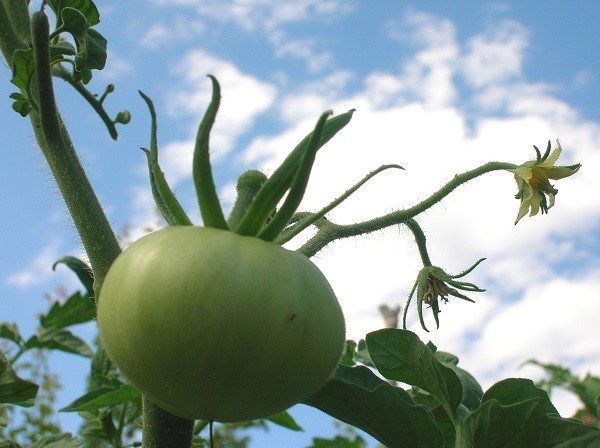
Photo: Chrissi Nerantzi
If we as individuals recognise there is a problem with plastic pollution, harmful preservatives and additives in food, toxic chemicals being sprayed on food, farmers committing suicide globally or how children are targeted with marketing campaigns for unhealthy food then we really should take responsibility to do something about it.
It’s very easy to do and there is definitely something we can all do today, from shopping differently or sharing the message on social media.
Can people make a difference by just doing one thing, for example taking sandwiches to work rather than buying a pre-packed one, or is a full lifestyle change needed? Is it all or nothing?
I think every step is a positive one. The biggest difference people can make however is to become aware of plastic in their everyday life and stop purchasing plastic without taking notice of the waste left behind when what’s inside is unwrapped.
Once you see the ludicrousness of, for example, some supermarket chains wrapping lettuce in plastic for us to buy ‘for convenience’, it seems that they have little care for this planet and instead they are only about money in the pocket – which sadly has led to the massive plastic soup that surrounds us now, formerly known as the ocean.
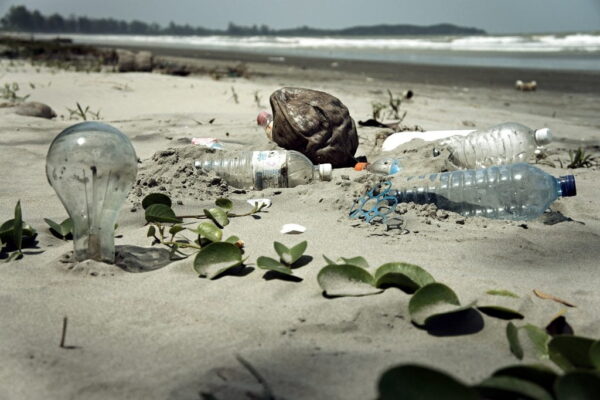
A polluted beach in Malaysia. Photo: epSos.de via Flickr
It may be more expensive at times but it’s an investment for our future that to me is a much better way to spend your money than other luxury items we may be tempted to buy.
It strikes me as a case of just behaving like we would have 60 or 70 years ago. Are humans overcomplicating things?
It’s not even that long. It was in 1962 that plastic started being used for wrapping food and it took a few decades to become the norm, so it’s not going back that far at all.
In one way, humans have definitely overcomplicated things, including the food we eat and how it is sourced. With the great permaculture and urban farming knowledge that is spreading, we can all be growing food in our homes, on our streets and basically anywhere there is sun, water and some dirt.
Think about all those parks that the council spends so much money on mowing lawns – would they not be better returned to food producing forests for all to eat, share and enjoy?
Imagine if we could source all our food from our homes, streets and public spaces like they have done in Todmorden, United Kingdom – now that’s an inspiring collective movement.
I do think many of us have got reliant and very trustworthy of companies whose sole and necessary motive is profit as per their business structure. Unfortunately what has happened with this however is quality has diminished to reduce costs and instead been replaced with fake foods, additives, chemicals, colourful packaging, catchy marketing and advertising jargon.
The majority of us have trusted large profit-driven corporations to be putting our health before their profit, and sadly this is not the case.
What successes have there been? Prove that this can work!
Personally I have had great success in removing plastic from my purchasing and becoming more aware of the choices I have in regards to my purchases – such as fruit boxes, community sponsored agriculture, co-ops and farmers’ markets. Further to this, I have discovered so many creative ways to not use plastic when it comes to food and bathrooms and have basically removed it from these areas of my life as well.
As a community, we have had great success in our intended outcomes, and also with more people opting for simply taking jars to do their shopping, filling them and returning home without any packaging and waste.
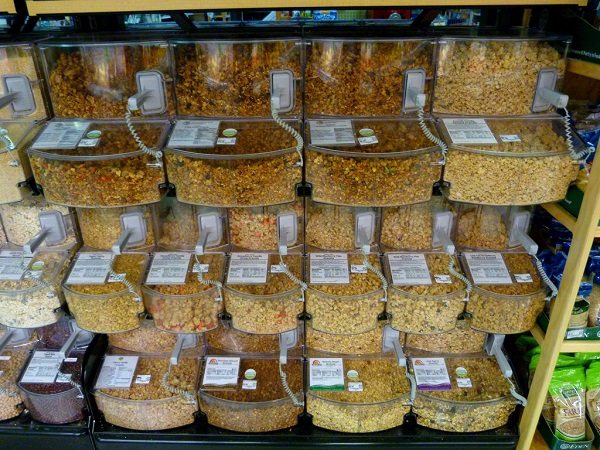
Sunseed Food Co-op, Florida. Photo: Rusty Clark via Flickr
In the eight months since launching, multiple community organisations have got behind our cause and continue to share the information we share, which is a great start.
Our school programme also resulted in children becoming completely responsible for any waste that they take with them to school; they now take it back home with them rather than disposing of it at school.
Imagine if people realised that ‘throw away’ is actually just to throw somewhere else – and their plastic waste will be on this planet for 500 years plus.
The school landfill bins were removed from the playground which was a great win, and this October sees our second ‘challenge’ – a multi-faceted community programme that utilises the power of collective action to encourage more sustainable, local and healthy food options and raises funds for local school canteens to educate children to reuse rather than dispose.
We will be working with bulk wholefoods stores across Australia (and have a few international stores in our sites too) who will provide a discount on bulk food throughout the month of October, therefore enticing participation.
Community participants will aim to purchase zero (or as little as possible) plastic during the month and will apply a self-imposed fine for any plastic they do purchase; they will be encouraged to gain sponsorship to do so.
Paul Creber runs Byron Bay’s Nude Your Food. If you are interested in the project, or the idea of reducing packaging and waste, visit www.nudeyourfood.com.
Francesca Baker is curious about life and enjoys writing about it. A freelance journalist, event organiser, and minor marketing whizz, she has plenty of ideas, and likes to share them. She writes about music, literature, life, travel, art, London, and other general musings, and organises events that contain at least one of the above. You can find out more at www.andsoshethinks.co.uk.
Further reading:
We need to use Grandma as inspiration to bring sustainability back into food
The Pig Idea: campaign looks to pigs to tackle food waste
Up to 40% of food wasted because of ‘ugliness’
Cleaning up our oceans: a journey from waste to wear
Declining health of oceans of ‘gravest concern’ to life on Earth


 Environment12 months ago
Environment12 months agoAre Polymer Banknotes: an Eco-Friendly Trend or a Groundswell?

 Features11 months ago
Features11 months agoEco-Friendly Cryptocurrencies: Sustainable Investment Choices

 Features12 months ago
Features12 months agoEco-Friendly Crypto Traders Must Find the Right Exchange

 Energy11 months ago
Energy11 months agoThe Growing Role of Solar Panels in Ireland’s Energy Future








